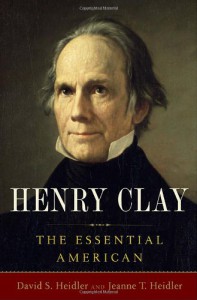Not as good as Remini's

Henry Clay is a singularly unfashionable figure for our times. A professional politician, he was a firm believer in compromise and celebrated as the greatest practitioner of it. Though he hungered for the presidency, he repeatedly reiterated his belief in legislative supremacy and opposed Andrew Jackson’s concentration of power in the executive. And when faced with the growing moral divide over slavery, he attempted to straddle the issue in a manner that would invite derision from both sides of the issue. Yet as David and Jeanne Heidler show, his death in June 1852 triggered nationwide mourning, a tribute to his long career and testimony to the esteem in which he was held by his contemporaries.
How he came to earn such passionate devotion is only partly covered in this biography, however, which focuses primarily upon Clay’s political career. This in itself more than justifies the hundreds of pages the authors devote to it, spanning as it does over half a century, from the early days of Kentucky’s statehood to the last major effort at political compromise before the Civil War. Much of this career was focused on becoming president, yet the Heidlers argue that he never really came close to the office, leaving instead an unfulfilled ambition that has given his distinguished career an aura of failure despite his many achievements.
The Heidlers lay our Clay’s career in admiring prose that conveys with clarity many of the issues and battles of his day. Yet is their book really necessary? There are no new arguments about Clay’s career within its pages, merely a lengthy narrative that does little to improve upon Robert Remini’s Henry Clay: Statesman for the Union, the yardstick by which Clay biographies must be judged. In most respects the Heidlers’ effort is much inferior, particularly in its coverage of the nonpolitical aspects of Clay’s life and in the frequent use of ahistorical (and ungrammatical) labels that are more reflective of modern-day partisanship than the politics of Clay’s time. Such issues mean that this is merely the latest Clay biography rather than the best, and that readers seeking to understand Clay’s life would be better served picking up Remini’s superior work instead.






